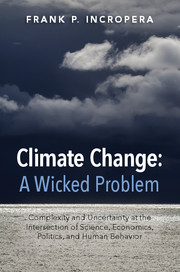 Climate Change: A Wicked Problem
Climate Change: A Wicked Problem Book contents
- Frontmatter
- Dedication
- Contents
- Foreword by Anthony F. Earley Jr.
- Foreword by G.P. “Bud” Peterson
- Foreword by Arun Majumdar
- Preface
- Acknowledgments
- Abbreviations
- 1 Energy, economics, and climate change
- 2 The Earth's climate system
- 3 Greenhouse gases
- 4 Global warming
- 5 Consequences of global warming
- 6 Mitigation, adaptation, and geoengineering
- 7 Public policy options
- 8 The politics of global warming: a history lesson and future prospects
- 9 Dissenting opinions: the great hoax
- 10 The ethics of climate change
- 11 A way forward
- Appendix A Units and conversion factors
- Appendix B Fossil fuels
- Appendix C Anthropogenic sources of natural gas and methane
- Appendix D Environmental time scales and inertia
- Appendix E Coal-fired power plants: operating conditions and costs of carbon capture and sequestration
- Notes
- References
- Index
- Plate section
11 - A way forward
Published online by Cambridge University Press: 05 October 2015
- Frontmatter
- Dedication
- Contents
- Foreword by Anthony F. Earley Jr.
- Foreword by G.P. “Bud” Peterson
- Foreword by Arun Majumdar
- Preface
- Acknowledgments
- Abbreviations
- 1 Energy, economics, and climate change
- 2 The Earth's climate system
- 3 Greenhouse gases
- 4 Global warming
- 5 Consequences of global warming
- 6 Mitigation, adaptation, and geoengineering
- 7 Public policy options
- 8 The politics of global warming: a history lesson and future prospects
- 9 Dissenting opinions: the great hoax
- 10 The ethics of climate change
- 11 A way forward
- Appendix A Units and conversion factors
- Appendix B Fossil fuels
- Appendix C Anthropogenic sources of natural gas and methane
- Appendix D Environmental time scales and inertia
- Appendix E Coal-fired power plants: operating conditions and costs of carbon capture and sequestration
- Notes
- References
- Index
- Plate section
Summary
“Climate change is occurring, is very likely caused primarily by human activities, and poses significant risks to humans and the environment.” This statement was made in a report prepared by the National Research Council (NRC, 2011), which is an agent of the U.S. National Academies of Science and Engineering and the Institute of Medicine. The view is shared by governmental science agencies across the world, as well as by an overwhelming majority of the global scientific community. We know that atmospheric GHG concentrations are rising, that the gases contribute to warming, and that warming is enhanced by feedback effects. We also know that atmosphere and ocean temperatures are rising, along with sea levels, as Arctic sea ice and glaciers continue to melt. The trends are due to the use of fossil fuels, and we know they will continue, even if atmospheric GHG concentrations were to remain at today's levels. And we are aware of the consequences, such as the impact of rising sea levels on low-lying coastal regions and the increased frequency of extreme weather events.
Yes, there are gaps in the scientific knowledge base. They've been addressed in previous chapters and are acknowledged in the NRC report. But the science underpinning a human impact on climate change is strong and getting stronger with each new study. This part of the debate is all but over. Most uncertainties are associated with partitioning of energy between the Earth's atmosphere and oceans and with understanding the consequences of climate change. Where and to what extent will the frequency and intensity of major storms increase; where will chronic drought and desertification be most pronounced; where and to what extent will ecosystems, biodiversity and agricultural production be adversely affected; and what will be the scope of attendant diasporas? It is not acceptable to focus on these uncertainties and to simply call for more research without addressing root causes of global warming and preparing to deal with the adverse effects of climate change. Because the potential consequences of global warming are profound, the prudent and morally responsible approach is to take action now. The NRC report states unequivocally that “uncertainty is not a reason for inaction.”
- Type
- Chapter
- Information
- Climate Change: A Wicked ProblemComplexity and Uncertainty at the Intersection of Science, Economics, Politics, and Human Behavior, pp. 242 - 258Publisher: Cambridge University PressPrint publication year: 2015
